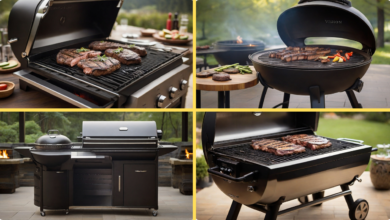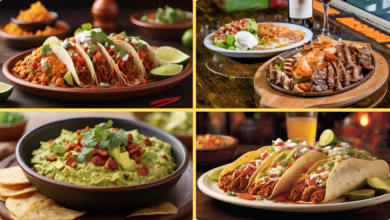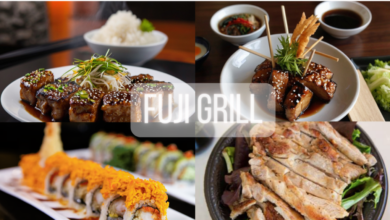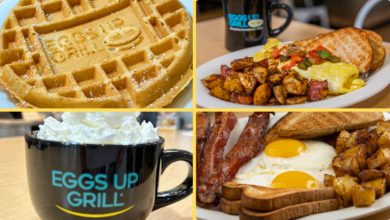![Grilling in the Rain: How to Safely Use Your Propane Grill [Expert Tips and Statistics] 1](https://thegrillshopboyertown.com/wp-content/uploads/2023/04/tamlier_unsplash_Grilling-in-the-Rain-3A-How-to-Safely-Use-Your-Propane-Grill--5BExpert-Tips-and-Statistics-5D_1680931605.webp)
Short answer: Can you use a propane grill in the rain?
It is generally safe to use a propane grill in light rain as long as it has a cover or lid to protect the flame from wind and moisture. However, be aware that heavy rain or thunderstorms can pose safety hazards and damage the grill, so it is recommended to move it under a covered patio or another sheltered area. Always follow proper safety precautions when grilling in any weather conditions.
Step-by-Step Guide: How Can You Use a Propane Grill in the Rain?
Using a propane grill in the rain can be quite challenging, but with this step-by-step guide, you will learn how to make the most of your outdoor cooking experience even when Mother Nature doesn’t cooperate.
1. Choose a Location:
The first step is to pick a location for your grill where it won’t be exposed to heavy rainfall or wind. Place it near an awning or umbrella if possible so that it remains dry while you cook.
2. Cover Your Grill:
If you don’t have any protection around, invest in a good quality cover for your grill as they come in every size and fit great. A cover can protect not only from water and wind but also keep the grill clean when not in use which means less maintenance.
3. Maintain Gas Pressure:
Before using your grill on a rainy day, check the gas pressure and make sure there are no leaks. Rainwater can interfere with propane flow leading to reduced pressure levels so be wary of that!
4. Preheat Your Grill:
Preheating is essential to ensure that food properly cooks despite being wet outside that hinders fire intensity — typically take 10-15 minutes to warm up properly before setting up the food items.
5. Keep Food Covered:
When grilling during rainfall, our natural inclination is often open lids since we want smoke exposure or monitor more closely in what is happening but trust us, keeping lids closed help maintain consistency & tends to retain heat better than open lids resulting into quick cooked food as well.
6. Balance Flavoring:
While rainwater splashes onto your dishes during preparation sometimes due process might suffer slightly because of restricted movement — add extra seasoning after taking off from flame/take shelter briefly under some covering for spicing up without losing its punch!
7. Consider Grilling Smoker Boxes:
Smoking boxes are cheap alternatives that may instantly transform regular BBQ meat into mouth-watering tasting meals & are commonly placed under the grill grates during cooking. It adds twice the kick in flavour with double times the satisfaction as well.
Rain or shine, with this guide, you can now grill delicious meals without any worries while enjoying the company of friends and family in wet weather! Enjoy 😊
Frequently Asked Questions About Using a Propane Grill in the Rain
Grilling is one of the most popular outdoor activities that people indulge in; it makes for a great weekend plan or an excellent way to spend time with friends and family. However, what happens when the rain clouds roll in just as you’re about to light up your propane grill? For many grillers, this situation can be frustrating, and it leaves them with several questions. To help quell your concerns, we’ve put together some frequently asked questions about using a propane grill in the rain.
Can I use my propane grill in the rain?
Yes, you can use your propane grill safely during a light drizzle or even under medium rainfall conditions. Most propane grills are built to withstand moderate amounts of water without causing any damage to their internal workings.
What precautions should I take when grilling in the rain?
One essential precaution is ensuring that your grill’s gas tank is always covered to prevent water from getting into it. Water inside a gas tank can corrode its insides and create other hazards while cooking on the grill.
Another measure is positioning the propane gas tank away from puddles or lower areas where standing water may accumulate. It’s also crucial to monitor temperature levels because grilled food takes longer to cook when there’s lots of moisture in the air.
How do I clean my propane gas grill after cooking in the rain?
Cooking on a wet surface creates two main types of dirt: food residue debris and soot buildup created by moisture interacting with ash deposits from previous grilling sessions.
To clean your barbecue properly after rainy-day use, make sure you brush off any excess pieces of food debris using an abrasive scrubber and warm soapy water mixture without harsh chemicals like bleach.
After cleaning the exterior surfaces, remove dirty drip trays first before disassembling parts like burners then scrubbing them thoroughly via heat-resistant brushes or steel wool with light degreasers used for safe cleaning and sanitation purposes.
How can I improve the cooking experience when grilling in the rain?
Consider investing in a good grill cover that has vents for releasing moisture or steam. This type of cover ensures your food stays dry and helps to provide consistent heat during wet-weather cooking sessions, letting you achieve well-cooked food as precisely as possible under any weather condition.
Lastly, check the outdoor temperature and avoid opening your grill’s lid often because it releases heat quickly when it opens up; otherwise, every time you flip those kebabs or turn over that steak, they’ll be getting a cool breeze from the outside.
Grilling on a propane gas grill makes for an enjoyable outdoor activity even in rainy weather. With these frequently asked questions answered, go ahead and plan your next barbecue with confidence regardless of the weather forecast!
Primary Precautions to Take When Using a Propane Grill During Rainy Weather
If you are a barbecue enthusiast, then you know that grilling is not only about creating delicious meals but also about enjoying the experience. However, one challenge that comes with outdoor cooking is dealing with unpredictable weather patterns, especially during rainy seasons. Using a propane grill in the rain can be quite tricky and dangerous if proper precautions are not taken.
In this blog post, we will discuss primary precautions to take when using a propane grill during rainy weather to ensure safety while still having fun.
1) Shelter Your Grill: One of the most common mistakes people make when grilling during rain is leaving their propane grill exposed without any cover. Not only does this expose your equipment to water damage and rusting, but it can also lead to gas leaks which pose a severe danger. To avoid these risks, always have your grill covered or sheltered under an awning or canopy.
2) Check Gas Connections: Another critical precaution to take when using a propane grill during rainy weather is thoroughly checking all gas connections before firing up your equipment. Rainwater has been known to trickle down into propane tanks and regulators making them wet and slippery. This can cause loosening of fittings or create gaps between coupling points leading to gas leaks once turned on. Therefore, it’s important always to inspect hose connectors before use and tighten loose fittings as necessary.
3) Let Your Grill Heat-Up: When you’re ready to get started with cooking on your propane grill in rain or shine – wait for it! Precipitation on burners can cause them to cool down unexpectedly rapidly by evaporating moisture against heated surfaces quickly resulting in disconnections from overheating parts in extreme cases like explosions due misfiring burns areas. So be sure let your grille heat up first – this should only take a few minutes at most -before placing any food onto its surface for cooking purposes.
4) Keep A Watchful Eye: Finally, never leave your propane grill unattended, especially in rainy weather. Bad weather conditions can cause gusts of wind and unpredictable elements that can make the grill unstable, which can lead to an accident if it is not correctly anchored. Sudden gusts of wind coupled with scattered embers can be disastrous as it may ignite objects around you or even spark an uncontrollable wildfire.
In conclusion, grilling during rainy weather can be challenging, but with proper precautions taken on primary areas discussed above, you need not worry about your safety while having fun making barbeque meals for yourself and loved ones. Do what you love most within safe parameters – enjoy grilled meats, vegetables and more despite the rain!
Tips and Tricks for Grilling Safely and Efficiently During Wet Conditions
Grilling is one of the quintessential summer activities enjoyed by many. Tasty meats, vegetables, and fruits cooked to perfection over open flames while enjoying the company of friends and family – what more could you ask for? However, weather conditions are not always ideal for grilling, especially during rainy days. While most grills can handle a little bit of rain or humidity, safety should always come first when cooking outdoors under wet conditions.
To help you enjoy your favorite grilled dishes safely and efficiently during wet weather, here are some useful tips and tricks:
1. Start with a clean grill
Regardless of the weather condition, it’s always important to Start with a clean grill. A dirty grill not only affects the flavor of your food but also increases the risk of flare-ups and accidents that can harm you or damage your property. Make sure to remove any leftover debris from previous grilling sessions using a sturdy bristle brush before lighting up your grill.
2. Keep an eye on the forecast
It’s essential to keep an eye on local weather forecasts before attempting any outdoor cooking activity. If there is any indication of severe thunderstorms or high winds in your area, it’s best to delay your grilling plans until things settle down.
3. Place your grill in a safe location
During wet conditions, it’s wise to place your grill in an area that provides adequate cover against rainwater and gusts of wind. Grilling under trees might seem like a good idea; however, branches can break off and fall onto hot grates or coals – causing dangerous situations.
4. Always have enough fuel on hand
Grilling under wet conditions generally requires additional fuel since water can evaporate at high temperatures faster than expected – leaving you without enough cooking power halfway through your BBQ session.
5. Use aluminum foil as needed
When trying to keep food warm or prolong its cooking time while avoiding contact with rainfall or condensation coming off the cover, aluminum foil can be an asset. Use it to create a tent-like structure or as a cover for individual dishes loaded with spices and seasoning.
6. Monitor your temperature
Weather conditions can affect cooking times because hot air tends to escape quicker from grills during wet weather – but don’t change your cooking time until you have an idea of how quickly your grill is heating up in these less than optimal circumstances.
7. Avoid adding extra liquid
Grilling in wet conditions might prompt individuals always to consider adding extra moisture or oil to prevent food from sticking. However, adding too much liquid can cause flare-ups or potentially dangerous spatters if it comes into contact with direct flames generated by grilling.
In conclusion, it’s possible and incredibly fun to keep grilling despite a bit of rainfall by applying these tips and tricks into practice. But ALWAYS remember – safety should always come first when cooking outdoors during any kind of inclement weather condition!
The Benefits of Grilling with a Propane Grill in the Rain
There’s nothing quite like the sizzle of steaks hitting a hot grill on a warm summer day. But what about those rainy afternoons, when the weather seems to be putting a damper on your BBQ plans? Fear not, propane grill fans – there are plenty of benefits to using your trusty propane grill even in less-than-ideal weather conditions.
First and foremost, propane grills offer precise temperature control that allows you to cook food to perfection, rain or shine. Unlike charcoal grills that rely on hot coals for heat, propane grills can be turned up or down with ease, allowing you to adjust the heat depending on how well done you want your burgers or chicken breasts.
Another major benefit of grilling with propane in the rain is the fact that it eliminates the need for messy charcoal or lighter fluid. Not only does this make cleanup easier (especially if things get wet and muddy outside), but it also reduces fire hazards and ensures a more consistent source of heat.
But let’s not forget one of the biggest perks of all – flavor. Propane grilling actually imparts a unique smoky taste onto food that rivals traditional charcoal grilling. This is due to the fact that drippings from meat and other food items will hit the hot metal plates beneath the grill grates, creating smoke that wafts back up and infuses your dishes with an extra layer of deliciousness.
Of course, one important consideration when grilling in the rain is safety. It’s always advisable to keep your grill away from any overhanging branches or structures that might drip water onto it during a storm. Additionally, you should never try to move or relocate a lit propane tank as this can result in an explosion or fire hazard.
Overall though, there are many reasons why using a propane grill in rainy weather can be just as enjoyable as cooking out in ideal conditions. Whether you’re looking for precision temperature control, easy cleanup, or deep flavor, propane grills are a reliable and versatile choice that can help you make the most of any kind of weather. So grab your raincoat and your favorite BBQ sauce – it’s time to get cooking!
Expert Advice: How to Maintain Your Propane Grill During Rainy Seasons
As the rainy season begins to loom, many grill owners worry about maintaining their propane grills. Understandably so, as the onslaught of rain can have a significant impact on the functionality and durability of your grill. However, with a few proactive steps and some expert advice, you can keep your propane grill in tip-top shape during the rainy season.
1. Invest in a good-quality cover:
One of the essential steps to protecting your propane grill is investing in an excellent quality cover that is specifically designed for your grill model. Not only will it protect your appliance from rainwater but also dust or debris that may make its way into your grill’s interiors. A good cover should fit snugly so that no water can seep through the edges and cause rust or damage.
2. Location Matters:
Another crucial factor to consider when preparing for wet weather is where you place your propane grill. Ensure that it isn’t set up near any drainage systems or low-lying areas, as these are prone to flooding during rainfall. You need to position it under a canopy or roofed area so that there’s ample protection from water pouring down from above, even if you have an umbrella style cover installed.
3. Cleanliness Is Key:
Maintenance of any object requires proper cleaning at regular intervals, and grills are not an exception to this rule! Before using your propane grill after the rainy season has come to an end – ensure you clean all leftover residue left behind by dampness carefully. Using a mild detergent solution mixed with warm water scrub off all surfaces followed by drying fully before igniting the burners again!
4. Store Your Propane Tank Correctly:
One common mistake people make when storing their outdoor appliances during wet weather is leaving their propane tanks connected unnecessarily.Click To Tweet Always disconnecting first could help minimize serious hazards such as fire accidents caused by gas leaks/damages within their houses.Getting them safely bundled away from moisture is key; thus, it is advisable to store them in dry areas such as the garage or shed!
5. Schedule a Professional Maintenance Check:
Getting your propane grill’s inner workings thoroughly inspected by a professional would go a long way in preventing significant malfunctions during the rainy season. It’s best to do this at least once a year but make sure to have it checked before using after an extended period of storage.
In conclusion, maintaining your propane grill during the rainy season shouldn’t be challenging with the right precautions and expert advice. Proper maintenance practices will preserve your equipment from water damage increase its longevity, and even improve performance for when you need to whip up those summer BBQs! So don’t hesitate to follow our lead – hop on board today so that you can keep enjoying mouth-watering grilled meals all year round!
Table with useful data:
| Question | Answer |
|---|---|
| Can you use a propane grill in the rain? | Yes, you can use a propane grill in the rain, but it’s important to take necessary precautions to ensure safety and prevent damage to the grill. |
| What precautions should be taken when using a propane grill in the rain? | – Make sure the grill is placed on a stable surface and not on wet grass or other potentially slippery surfaces. – Use a grill cover to prevent excess rain water from reaching the propane tank and other internal components. – Avoid using the grill in extremely windy conditions as this could impact the flame’s intensity. – Be sure to turn off the gas supply and check for leaks before and after using the grill in wet conditions. |
| What are the risks of using a propane grill in the rain? | – Increased risk of slipping or falling if the grill is not placed on a stable surface. – Water damage to the propane tank and other internal grill components. – Reduced flame intensity and difficulty maintaining heat if the weather conditions are particularly windy or rainy. |
Information from an expert
As an expert in grilling, I highly advise against using a propane grill in the rain. It poses a significant risk of fire and electrical hazards, which can cause damage to both you and your grill. Moreover, propane gas is heavier than air and has the potential to create a pocket of gas around your grill leading to potentially lethal explosions. It’s not just about safety; rainy weather also affects the performance of your grill since it can rust, corrode or experience mechanical issues over time. Keep yourself safe and your grill in top-notch condition by refraining from using it during rainy weather conditions.
Historical fact:
During the 19th century, outdoor cooking was commonly done over an open fire. Rain would often pose a challenge for cooks as it could extinguish the flames or make the ground too wet to build a fire. Today, with the invention of propane grills and other outdoor cooking appliances, rain is not as much of an issue for those who enjoy outdoor dining. However, it is important to note that using a propane grill in heavy rain can be dangerous and cause gas leaks or flare-ups.



